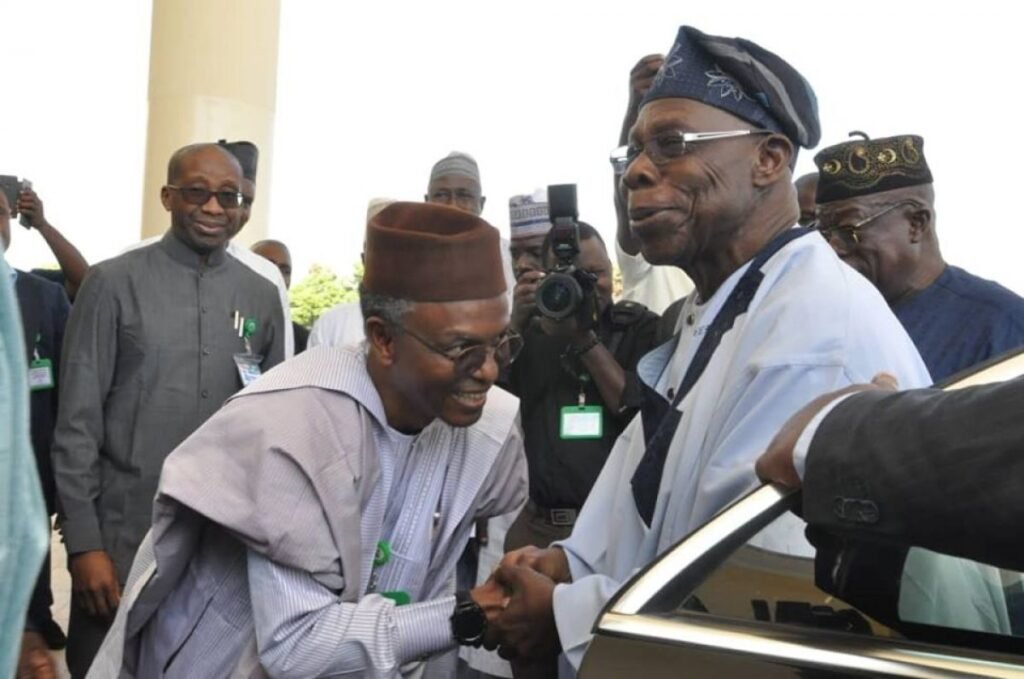FORMER President Olusegun Obasanjo has revealed that he once rejected a proposal recommending former Kaduna State Governor, Malam Nasir El-Rufai, as his preferred successor when he was exiting office in 2007.
News Point Nigeria reports that Obasanjo made the disclosure on Friday in Abeokuta, Ogun State, while speaking at the second edition of the annual Ajibosin Platform Symposium with the theme “Importance of Leadership in Governance.”
El-Rufai served under Obasanjo’s administration as Director-General of the Bureau of Public Enterprises (BPE) and later as Minister of the Federal Capital Territory (FCT) between 2003 and 2007.
The former president, who eventually endorsed the late President Umaru Musa Yar’Adua to succeed him, said the suggestion to back El-Rufai at the time was strongly pushed by former Minister of Aviation, Osita Chidoka.
Chidoka, who delivered the keynote lecture, had earlier narrated how El-Rufai recommended him to Obasanjo at the age of 34, a gesture that led to his career breakthrough and appointment as Corps Marshal of the Federal Road Safety Corps (FRSC).
But Obasanjo, speaking shortly after Chidoka’s address, challenged him for not telling the full story.
“Let him tell you. He didn’t mention that he was pushing when I was leaving government that his friend, El-Rufai, should be brought in as my successor,” Obasanjo said, prompting laughter among the audience.
Turning to Chidoka, the former president asked, “No be so?” to which Chidoka nodded in agreement.
Obasanjo explained that he rejected the suggestion because he believed El-Rufai was not yet mature enough for the job at the time.
“I did not yield to the pressure. Later, he asked, ‘I suggested this person, why didn’t you agree?’ I said El-Rufai needs to mature. Many years later, he came back to me and said, ‘You’re absolutely correct. El-Rufai needed to mature.’”
Despite the revelation, Obasanjo praised Chidoka, El-Rufai and others who served under him, saying many of them possessed “special attributes” that enabled his administration achieve major reforms.
Speaking further on leadership, Obasanjo stressed that competence and character should be the foundation of governance.
“It’s only in politics that I found out there is no training for leadership. Even among armed robbers, I was told there is apprenticeship. But in politics, there is none. That’s not good enough,” he said.
In his keynote address, Chidoka argued that Nigeria’s challenges stem from weak systems rather than the absence of ideas.
“Leadership finds its measure not in charisma or speeches but in the systems it leaves behind,” he said.
He called for institutional reforms that make governance accountable and reduce impunity in public office.
Convener of the symposium, Aare Olanrewaju Bakinson, said the event aimed to provoke reflection on the critical importance of ethical and visionary leadership in nation-building.
Dignitaries at the event included Senator Shuaibu Salis (Ogun Central); the Olowu of Owu Kingdom, Oba Prof. Saka Matemilola; the Olota of Ota, Oba Adeyemi Obalanlege; and former Ogun First Lady, Mrs. Olufunsho Amosun.







